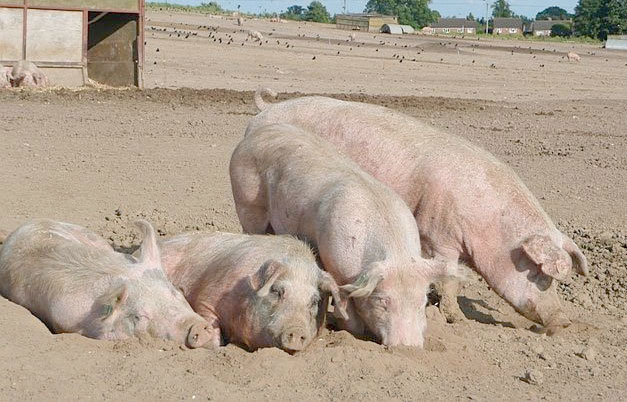
A fast mutating virus that affects pig herds and costs pork producers millions of pounds each year is being targeted by scientists.
A transatlantic research group is to tackle porcine reproductive and respiratory syndrome (PRRS), which leads to reproductive failure in breeding stock and causes respiratory tract illness in young pigs.
Also known as Blue-Ear Pig Disease, the condition can prove fatal as it affects pigs’ immune systems and leaves them vulnerable to other infections.
Researchers at The Roslin Insitute, at the University of Edinburgh, are working with Iowa State University, which has received a $3 million grant, to find ways to tackle this devastating virus.
They will study whether some pigs have a genetic makeup that makes them less likely to become sick following infections. This knowledge could help to ensure the breeding of healthier pigs, which are less likely to succumb to PRRS.
The virus is especially virulent as it evolves rapidly. As a result it now has many genetic variants. This causes challenges in vaccine production, as an inoculation against one strain does not protect against another strain of the virus.
The research will include look at whether breeding for a specific gene variant, which protects against PRSS, does not have knock-on effects such as making the animal more vulnerable to another disease.
Although the exact economic impact of PRRSV has not yet been quantified in Europe, the virus is estimated to cost the American swine industry around $600 million a year – almost a third of its losses related to infectious diseases.
Professor Steve Bishop, of The Roslin Institute said: “The constant mutation of the PRRS virus means that the efficacy of vaccines is severely hindered. This collaborative research project will enable us to assess the potential use of breeding to help reduce the impacts of this problematic disease.”
The $3 million grant to look into PRRS was awarded by the US Department of Agriculture’s National Institute of Food and Agriculture, while The Roslin Institute receives strategic funding from the Biotechnology and Biological Sciences Research Council.
Professor Jack Dekkers, from Iowa State University, said: “This grant is going to help us continue our work towards finding a way for the pork industry to get a handle on a costly and difficult-to-control disease, and we’re excited to move forward with our collaborators.”
Identifying gene variants that protect against infection can be a tricky process, and researchers have to be certain that breeding for a specific gene variant that makes pigs less susceptible to PRRS doesn’t have unintended consequences, such as making the animal more vulnerable to another disease.
